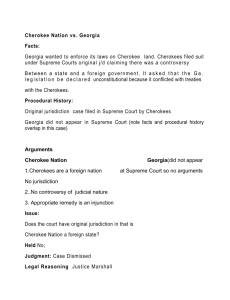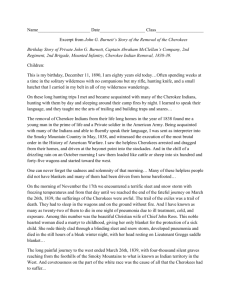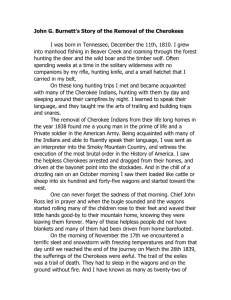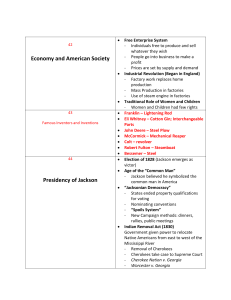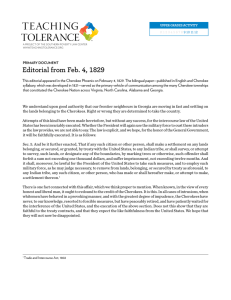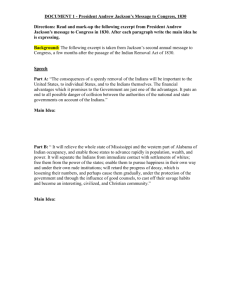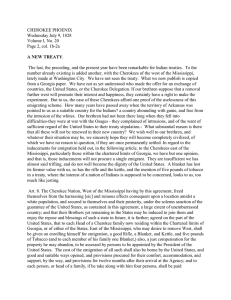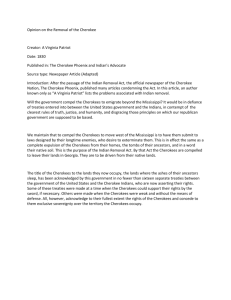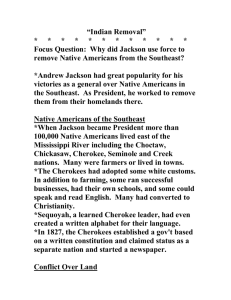To the Senate & House of Representatives of the United... The Memorial of the citizens of the city of Hartford...
advertisement
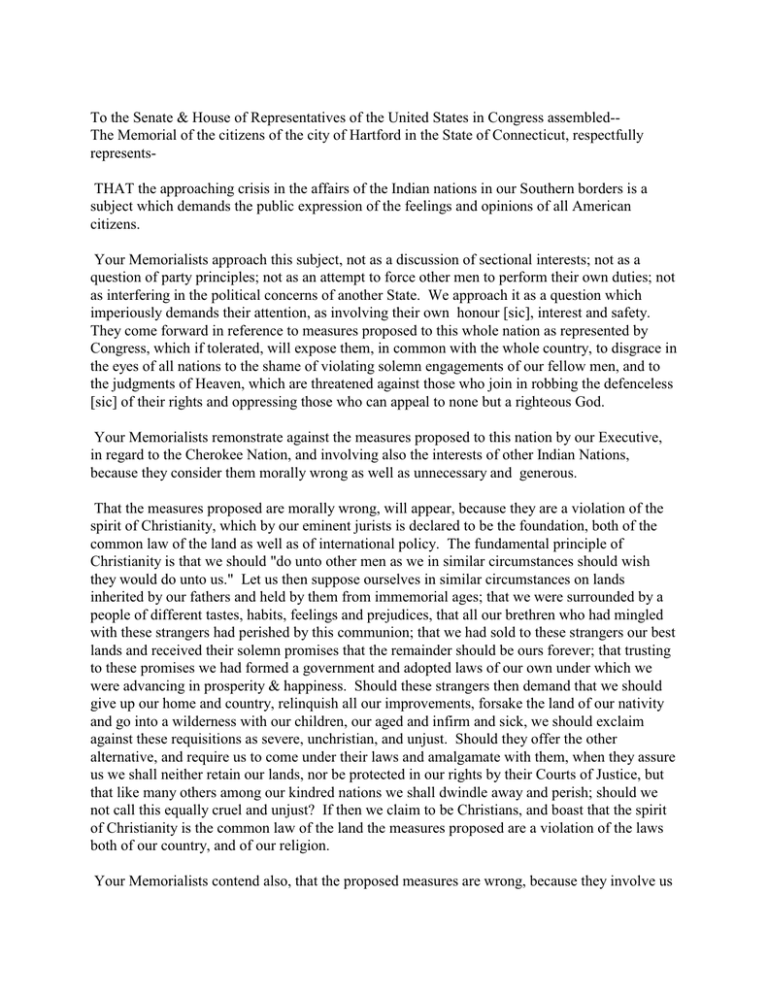
To the Senate & House of Representatives of the United States in Congress assembled-The Memorial of the citizens of the city of Hartford in the State of Connecticut, respectfully representsTHAT the approaching crisis in the affairs of the Indian nations in our Southern borders is a subject which demands the public expression of the feelings and opinions of all American citizens. Your Memorialists approach this subject, not as a discussion of sectional interests; not as a question of party principles; not as an attempt to force other men to perform their own duties; not as interfering in the political concerns of another State. We approach it as a question which imperiously demands their attention, as involving their own honour [sic], interest and safety. They come forward in reference to measures proposed to this whole nation as represented by Congress, which if tolerated, will expose them, in common with the whole country, to disgrace in the eyes of all nations to the shame of violating solemn engagements of our fellow men, and to the judgments of Heaven, which are threatened against those who join in robbing the defenceless [sic] of their rights and oppressing those who can appeal to none but a righteous God. Your Memorialists remonstrate against the measures proposed to this nation by our Executive, in regard to the Cherokee Nation, and involving also the interests of other Indian Nations, because they consider them morally wrong as well as unnecessary and generous. That the measures proposed are morally wrong, will appear, because they are a violation of the spirit of Christianity, which by our eminent jurists is declared to be the foundation, both of the common law of the land as well as of international policy. The fundamental principle of Christianity is that we should "do unto other men as we in similar circumstances should wish they would do unto us." Let us then suppose ourselves in similar circumstances on lands inherited by our fathers and held by them from immemorial ages; that we were surrounded by a people of different tastes, habits, feelings and prejudices, that all our brethren who had mingled with these strangers had perished by this communion; that we had sold to these strangers our best lands and received their solemn promises that the remainder should be ours forever; that trusting to these promises we had formed a government and adopted laws of our own under which we were advancing in prosperity & happiness. Should these strangers then demand that we should give up our home and country, relinquish all our improvements, forsake the land of our nativity and go into a wilderness with our children, our aged and infirm and sick, we should exclaim against these requisitions as severe, unchristian, and unjust. Should they offer the other alternative, and require us to come under their laws and amalgamate with them, when they assure us we shall neither retain our lands, nor be protected in our rights by their Courts of Justice, but that like many others among our kindred nations we shall dwindle away and perish; should we not call this equally cruel and unjust? If then we claim to be Christians, and boast that the spirit of Christianity is the common law of the land the measures proposed are a violation of the laws both of our country, and of our religion. Your Memorialists contend also, that the proposed measures are wrong, because they involve us in the guilt of violating solemn promises made by the United States to the Cherokee Nation. There are now on record in the archives of our nation, several treaties, signed by distinguished statesmen and ratified by our Presidents and Senate. In these treaties the Cherokees are addressed as a "Nation"; their rulers are acknowledged as capable of representing them and making treaties on their behalf, their power to declare war and make peace is acknowledged, their right to sell their lands, or to retain them at their own option is conceded; their right to exclude the citizens of the United States from their land and from their rivers is acknowledged; their right to punish by their own laws American citizens who settle within their boundaries is granted; their right to prevent the arrest of individuals fleeing from the justice of the United States, except by the authority of the Cherokee government is acknowledged. All these, and other rights of an independent nation are freely allowed to them and acknowledged under the hand and seal of the appointed organs of this nation. To this people, thus accredited in all their rights of soil and jurisdiction, we have solemnly promised the entire and full possession of the country they have refused to relinquish "Forever". We have promised that no one shall seize it, or hunt or fish or settle upon it without the consent of the Cherokee Nation, and we have made various other stipulations in our treaties, which imply that they are, and may continue to be independent nations forever. But it is maintained that the State of Georgia can extend her laws over the Cherokees, annihilate their government and incorporate them as citizens of the State; and yet that this nation can permit this to be done and honorably discharge their solemn engagements. But your Memorialists deny the possibility of such a procedure, without involving a total failure of truth and honour [sic] on the part of this nation.-The legislature of Georgia openly maintains her right not only to the jurisdiction over the Cherokees, but to the soil on which they reside, and openly declares that they will take possession of such parts of the Cherokee country, as they see fit. Laws have been framed to direct reference to the Indians, which as soon as they come into operation, denationalize them, and the Cherokees immediately become private citizens of Georgia, with no more rights, than are allowed to other citizens; and if their recent laws in regard to the Indians, are to be considered as a fair example of what the Indians are to expect, with rights and privileges far inferior to other citizens of Georgia. And when this is done can it be pretended that the United States can fulfil its treaties? Can our government then exclude its citizens from the lands and waters of the Cherokees? Can it permit them to try and punish American citizens who settle among them by their own laws?- Can it allow them to prevent the interference of the officers of justice of the United States out of respect to the Cherokee laws? Can it keep off intruders from their lands and preserve them inviolate? If the United States will have such power as this over the citizens of Georgia, it will be an anomaly never yet known in our government, never peaceably granted by the State of Georgia, and utterly impracticable in operation. Your memorialists maintain that if the laws of the States are permitted to be extended over the Cherokees, they are at once denationalized, and the United States forever debarred from all power to fulfil its treaties, and that, therefore, the National Government is solemnly obligated to prevent this, so long as it acknowledges the obligation of promises, and has the power to perform them. But it may be maintained on another ground that our government has not only indirectly but directly promised to the Cherokees, not only the possession but the jurisdiction of soil. One most distinguished writer on ethics, has defined a promise to be "an engagement made between two parties, to be interpreted in the sense in which the promiser believed the promisee to receive it." This is illustrated by an example of a violated promise, in which a garrison in Spain surrendered; owing to a promise that "no blood should be shed," and this promise was discharged by burying all the garrison alive. This act is declared to be the violation of a promise, because the performance was not in the sense in which the promisor knew the promisee received the engagement. Now it can be clearly proved by referring both to our treaties with the Cherokees, and to the conduct both of the United States and the Indians in consequence of them, it was understood by the Cherokees, that jurisdiction was guaranteed to them, together with the possession of the soil, and that the United States government believed and had a full evidence, that this meaning was attached to their treaties by the Cherokees.-- No fact can be demonstrated with fuller evidence that this; if, therefore, the Indian believed that jurisdiction was guaranteed with their soil, and the United States government knew that it was so believed by the Indians, according to the authority of the standard writer on ethics, the United States made a solemn promise to the Cherokees not only of securing to them their lands but full jurisdiction over their soil. But it has been maintained that the treaties we have made with the Indians are not to be interpreted on common principles, that these people are anomalies upon the earth; that while we have been making treaties with them we have also been legislating for them, and thus have occasioned inconsistencies, that cannot be reconciled on common principles used in interpreting treaties with other nations. But what are the facts upon which this reasoning is founded? It appears that other States made and kept their treaties with Indians so long as they preserved the character of separate communities, under their own laws-That as these people gradually dwindled away, or mingled with the whites, it became necessary to make some regulations, to restrain their vices, and that this was in most cases done by conventional agreement with the Indians themselves, and never executed contrary to the remonstrances of any national community. But no State in this Union has ever passed its laws over a community of Indians having laws and government of its own; and no community of Indians in any part of our country, have ever contrary to their own wishes been subjected to criminal and civil jurisdiction of the States in which they reside. But supposing that the separate States in their intercourse with the Indians have adopted measures that seem anomalous and inconsistent with the measures adopted by our general government--this does not impose any obligation to furnish another anomaly, in the violation of the plighted faith of a Christian nation. Because some of our States in certain cases have made laws for Indian nations, as they gradually lost their national character, and thus their necessities and our own demanded a departure from ordinary usages, adopted toward independent nations, is it maintained that we are released from obligations to keep the promises made to a nation which has lost none of its characteristics of sovereignty? If then the treaties and promises of this nation can so easily be evaded, it well becomes us to conceal it from the other nations of the earth. Should it be maintained that our statesmen and rulers did not understand the full extent of their obligations, and therefore did not agree to be so obligated. We should be long in consenting thus to stultify the acts of the Father of his Country, and of his venerable successors in office, and the acts of such men as Knox and Johnson, and Verick, and our own Ellsworth. But even granting that they had not wisdom, nor foresight enough to discern the consequences of their solemn engagements, we are not yet prepared to break national promises, because they interfere with some of the plans of those who are bound to be controlled by them. For it must be remembered, that all the agreements made with the Cherokees, have been ratified by the Senate of the United States, and thus by Georgia herself through the hands of her Senators in Congress. If such agreements interfered with her rights, she herself has consented to them, and is bound to maintain her honour and good faith. If in doing this, she relinquish some expected advantages, she at least retains the honor bestowed on him, who "sweareth to his own hurt and changeth not." Your memorialists also protest against these measures, because we consider them not only as wrong, but as entirely unnecessary. They are unnecessary for the preservation or prosperity of the States bordering on the Indian country. We have never heard of any evils suffered by the inhabitants of Georgia from the hand of the Cherokees that are not all susceptible of remedy and with far less expense of treasure than is necessary to remove them, and of honor than is necessary to violate treaties. Is it complained that depredations can be committed in the States on their borders? Our government con-remunerate the losers, by deductions from the annuities granted to the Indians for their lands as has been agreed to by the Cherokees themselves. Is it objected, that freedom of intercommunications is checked? The Cherokees have never refused to have necessary roads cut through their country, or any other improvement of this kind deemed necessary by our government; and in reference to any danger to be apprehended to the citizens of the States interested in the question, it is too irrational a supposition to be a moment allowed. About 5,000 of the Cherokees reside on the lands claimed by Georgia, and only 75,000 is the whole of our Southern States. What possible danger could be apprehended from these small communities in the retired and isolated stations they have retained, by the citizens of a country numbering its millions and abundantly powerful, both to protect and to punish. It is not pretended that these States which border on the Indian countries ever have been essentially injured by the Indian neighbors, tho' they have been more numerous and powerful than they now are. Why then should they be feared when reduced in numbers & regulating themselves by the law and institutions of a civilized State? Nor are the measures proposed necessary for the Indians themselves. It cannot be denied that with the feelings which are entertained towards this helpless race by those who surround them, there is great probability of their suffering many evils in their present situation. But there is a choice of evils and the Cherokees say they choose to retain their home and country, even if they must perish on its soil. Your memorialists conceive that it is an absurdity to maintain, that the Indians, if they cannot live and prosper surrounded by a Christian people, and under the immediate eye and protection of the United States, with a form of civil government already adopted, and churches, schools and all the resources of civilized and Christian people going into successful operation; that they can be benefitted by the destruction of all their social, political and religious institutions, by a removal to uncultivated lands, by being surrounded by wild Indians and other tribes with different languages and habits, while at the same time they encounter the certainty, of being again surrounded by the whites after the lapse of a few years. If population advances, at the rate it has heretofore done, all the causes which are now urged as making it necessary for them to remove will in twenty years, surround them in that distant land of their banishment. No benefit will be gained except that in that far country, their miseries will not be exposed to our eyes, nor their cries reach our ears. There is a singular inconsistency in the representations of those who advocate the removal of the Indians. It is urged that if they remain among the whites they will soon dwindle away & perish as other tribes have done. But if this is true, why should the states that surround them be thus anxious for their removal or why should this nation incur the vast expense which will be demanded to effect it? If they choose it, let them die on their native soil and sleep in the sepulchers of their fathers. If it is not true, then the only argument founded on the necessity of a removal for their benefit is gone. Much false reasoning on this subject has been owing to judging of the Cherokees and their circumstances by the habits, character, and circumstances, of our north western tribes and by the small remnants of tribes on other States-many things can be asserted of them which are not true of the Cherokees. This people have not known that untamed ferocity, nor that fixed attachment to old habits and institutions, which have prevented other tribes from adopting the improvements of civilized life, as is proved by their agriculture, their manufactures, their schools, their churches, and their political institutions.- True, the statements on these subjects received from men of veracity residing among them, and from intelligent gentlemen who have recently visited them are by many deemed worthy of less confidence than the assertion of men hundreds of miles from the scene, who receive the testimony of prejudiced and self interested persons, or reason from false analogies. When the minute statistical accounts given to the public of the flocks and herds, and manufactures & schools and churches, and political institutions, existing among these people, are proved to be false it will be proper to impeach the testimony of honorable and conscientious men, who have been eye witnesses of what they state and who stake their reputation on the truth of the statements. These measures cannot be urged as necessary on the ground of natural right. If it be said that wandering tribes, or hunters, have no claims upon the country over which they roam, this is nothing to the purpose, for the Cherokees never were a wandering tribe, nor is there a single family supported by hunting. If it be urged that it is contrary to justice and the established laws of nature to leave vase tracts uncultivated to savage nations, this also is nothing to the purpose, for the Cherokees have reserved no more than they may need should they become civilized, and their population increase to anything like the ordinary ratio. Your memorialists also remonstrate against the measures proposed not only because they appear wrong and unnecessary, but also because they are deemed in the highest degree ungenerous. The Indians appeal not only to our justice and self imposed obligations, but to our generosity and magnanimity. It is true that partisan writers have maintained that the Cherokees do wish to remove and are held in restraint by their Chief men. But where is the authority for this supposition? The public functionaries of their community, have declared that their people do not wish to remove and have made it high treason against the state, to propose such a measure because they believe it tends to the destruction of their nation, and they possibly may have decided that sentence of high treason shall be executed by the tomahawk instead of the axe or rope. When the constituted authorities of this nation, declare that their people do not wish to remove when it appears that there is no motive, that could possibly urge them of their own accord to adopt such a measure, when those of our countrymen who dwell in their boundaries and are entitled to credit, assert, that the people do not wish to leave their country, when gentlemen of veracity who visit them agree in this statement, and their national Gazette holds the same language, what right have those who have no personal knowledge to dispute this evidence? Your memorialists maintain that the Cherokees have, by their proper organs of communication, declared themselves unwilling to forsake their native land, and have appealed to our sympathies as well as our justice to sustain them in their rights; and if others of our countrymen are willing to bear the stigma of turning a deaf ear to their cries, we are not willing and we protest against being involved in any measures which will cause us to blush, to be recognized by the name of our country. Your memorialists cannot bring themselves to believe that such measures will receive the sanction of the representatives of this nation. But should every other state in this Union, by the voice of the delegates, sanction the measures proposed let those who represent our own State stand aloof from the shame. We charge them that the fair name and unspotted honor of old Connecticut be not sullied by her sons; that in this momentous question they take care neaquid respublic detremeati caperet." Your memorialists also respectfully and earnestly entreat the two Houses of Congress, to interpose the authority of all their venerable body, in the exercise of their lawful prerogatives, to avert the evils they deprecate. If there is anything to be regarded in the sympathy which wakes us in every human breast with the unfortunate and helpless; anything from the indignation of every generous mind at wanton oppression and robbery, anything from the detestation, with which every honorable man regards treachery, fraud and violation of truth, they entreat that this State with our common Country may not be exposed to such a stigma and shame. If there is anything interesting and tender in the recollections of the early infancy of our own nation, of the anxiety, toils, and difficulties amid which our fathers struggled for the existence and perpetuity of the institutions they originated and loved, of generous aid afforded to them by many of a hapless race whose bones now whiten our soil they implore that these children of the forest, who are just struggling for existence as a civilized and Christian nation and who stretch out the supplicating hand for aid, may not be crushed by the only human arm that can sustain them, the only earthly power that can protect. If there is anything to be valued in the respect of other nations in the esteem of the philanthropists and sages and honorable men of other lands, if there is any value in the broad admiration and love with which the aged and generous hero of France claims the name of our Country and numbers himself among her sons, they beseech that a deed may not be perpetrated that will lift the finger of scorn at every American, and raise the blush of shame and sorrow in the cheek of those who may have gloried in the name. If there is anything gentle & tender in the endearments of home, so that even in the Hall of our Senate and Legislatures, the thougt of domestic firesides, the smile of infancy and sports of childhood, will mingle with the cares of State; if the name of husband and father and brother and son, is charming to any ear, or dear to any heart, they implore that the holy charities of life,may not by our ruthless hand be scattered to the winds, by severing the ties of country and kindred, and sending destruction & desolation among a people, who now are partakers of these joys. If there is anything to be feared in the curses of Jehovah, who hath made of one blood all the nations that dwell on the face of the earth, who at his pleasure lifteth up one nation and casteth down another, who hath declared Himself the Judge and avenger of the helpless and oppressed, who will bring before His awful tribunal, both the rulers and the people of all the nations of the world, we implore that the curses which are suspended over this nation may be averted by our rulers, lest in a few fleeting years all kindreds of the earth over the ruins of this now glorious fabric of our nation shall rend the fiery characters of Heaven, "cursed be he that perverteth the judgement of the stranger, fatherless and widow." "and all the people shall say Amen." And your memorialists &c.
